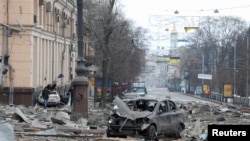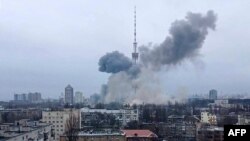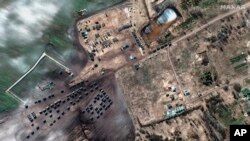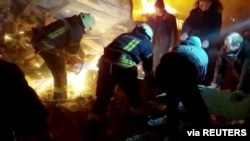Ukraine’s second-largest city, Kharkiv, faced increased Russian shelling Tuesday, while a column of Russian forces stretched out along a road north of the Ukrainian capital of Kyiv on the sixth day of Russia’s invasion of its neighbor.
The Ukrainian Foreign Ministry shared a video of one strike at the Kharkiv Regional State Administration building in the center of the city that created a huge ball of fire and smoke as several cars passed through.
Ukrainian President Volodymyr Zelenskyy described Russia’s missile attack on Kharkiv’s main square Tuesday as "frank, undisguised terror" as well as a war crime. "Nobody will forgive. Nobody will forget. … This is state terrorism of the Russian Federation."
An emergency services official said the strike killed at least six people and injured 20 others.
European Union foreign policy chief Josep Borrell said Tuesday that Russian shelling of civilian infrastructure that took place Monday in Kharkiv “violates the laws of war.”
Kremlin spokesman Dmitry Peskov dismissed allegations of war crimes and told reporters that “Russian troops don’t conduct any strikes against civilian infrastructure and residential areas,” despite extensive, mounting evidence of Kremlin attacks on homes, schools and hospitals, which reporters for The Associated Press have documented.
Later Tuesday, Ukraine’s parliament said a Russian missile hit the television tower in Kyiv. Local media reported the attack caused several explosions and Ukrainian channels stopped broadcasting shortly thereafter.
Ukrainian officials said five people were killed in the attack. Ukrainian Foreign Minister Dmytro Kuleba tweeted that it rekindles memories of the mass killing of Jews by Nazi SS troops and local collaborators during World War II.
“Kyiv TV tower, which has just been hit by a Russian missile, is situated on the territory of Babyn Yar. On September 29-30, 1941, Nazis killed over 33 thousand Jews here. 80 years later, Russian Nazis strike this same land to exterminate Ukrainians. Evil and barbaric.”
Ukraine also reported Tuesday that troops from Russian ally Belarus had entered Ukraine’s Chernihiv region.
Russian forces north of Kyiv are being closely watched amid fears of an assault on the capital. U.S. defense officials and British intelligence said the convoy has not made much progress toward the city in recent days.
“We generally sense that the Russian military movement, not just this convoy but the overarching movement on Kyiv is stalled,” a U.S. senior defense official told reporters Tuesday.
The official, who spoke on condition of anonymity in order to discuss intelligence, said, “We have picked up independently on our own indications that morale is flagging on some of these [Russian] units,” adding, “They did not expect the resistance they were going to get.”
But the official added that it is important to be pragmatic. The Russians still have a significant amount of combat power that has not yet been tapped, and “they will regroup, they will adjust, they will change their tactics.”
One U.S. official told reporters Monday the convoy’s “main push” was 25 kilometers outside the city.
Satellite images from Maxar Technologies have shown the convoy becoming longer, stretching for about 64 kilometers in images taken Monday.
“For the enemy, Kyiv is the key target,” Zelenskyy said in a video message late on Monday. “We did not let them break the defense of the capital, and they send saboteurs to us. ... We will neutralize them all.”
In Poland, NATO Secretary General Jens Stoltenberg said the alliance will hold both Russia and Belarus accountable for what is happening in Ukraine.
“President Putin has shattered peace in Europe. Allies condemn the unjust and brutal invasion of Ukraine. The Russian assault is totally unacceptable, and it is enabled by Belarus,” he said.
Russia has used Belarusian soil for troop drills and as a staging ground to strike at Ukraine.
Stoltenberg reiterated that NATO will not be sending troops to fight in Ukraine, nor will it be patrolling Ukrainian airspace, while calling on Russia to immediately “stop the war” and withdraw its forces. Speaking alongside Polish President Andrzej Duda, Stoltenberg thanked Poland for opening its borders to refugees fleeing the fighting in Ukraine.
Speaking virtually Tuesday to the European Parliament, Zelenskyy issued an emotional appeal for more support, declaring that Ukraine’s fight for democracy deems the country worthy.
"We are fighting also to be equal members of Europe. I believe that today we are showing everybody that is what we are. ... We have proven that as a minimum, we are the same as you."
The U.N. refugee agency said Tuesday that more than 660,000 people, most of them women and children, had fled Ukraine to neighboring countries since Thursday.
The U.N. human rights office reported at least 136 civilian deaths in Ukraine, including 16 children. The deaths are largely the result of about 400 documented missile strikes on civilian and military targets, according to senior U.S. defense officials.
“The real toll is likely to be much higher,” spokesperson Liz Throssell said during a briefing.
The Kremlin said Russian President Vladimir Putin told French President Emmanuel Macron in a call Monday that a settlement can only happen if Russia’s “legitimate security interests” are considered, including the demilitarization of Ukraine.
Australia announced plans Tuesday to send missiles to Ukraine as part of a $50 million package. Australian Prime Minister Scott Morrison told reporters the lethal and non-lethal aid comes in response to a call by Zelenskyy for Ukrainian allies to send his country military support to oppose the invasion, and “that’s exactly what we’re doing,” Morrison said.
Roughly 100 diplomats, mostly from Western countries, walked out of a United Nations Human Rights Council speech by Russian Foreign Minister Sergey Lavrov in Geneva on Tuesday in protest of the invasion. The walkout, which was led by Ukraine’s ambassador to the United Nations in Geneva, occurred as Lavrov appeared at the session via video link, saying he was unable to attend in person because of European bans on flights from Russia.
U.S. lawmakers are considering a White House request for $6.4 billion in military and humanitarian aid. The Ukrainian ambassador to the U.S., Oksana Markarova, told a group of U.S. senators in a meeting Monday that Ukraine needs more weapons.
“It’s David versus Goliath,” said Senator Jim Risch, the top Republican on the Foreign Relations Committee, noting the much larger size of Russia’s military. “I think that any human being reading the reports coming out of there realize that this is dire.”
Markarova, who is slated to join Jill Biden in the first lady’s box for the president’s State of the Union address, also advocated for U.S. sanctions against Russia’s oil and gas sectors after joining with numerous other countries to apply economic pressure on Putin with sanctions targeting top officials, business figures and the Russian financial system.
"We need to consider stopping the flow of energy from Russia to the United States and enlist our allies in the same cause,” Democratic Senator Richard Blumenthal said.
The New York Times reported Tuesday that numerous American law and lobbying firms have dropped Russian clients in response to the invasion, according to government filings.
Reuters reported late Tuesday that Russian President Putin issued a decree banning cash exports of foreign currency from the country exceeding $10,000 in value with effect from March 2, according to a Kremlin statement.
Also on Tuesday, Echo Moskvy, one of Russia's oldest radio stations that is critical of the authorities, was taken off the airwaves. The Associated Press confirmed that the blockage, along with threats to shutter the renowned station permanently, is a result of its coverage of the invasion.
Putin has now committed nearly 75% of the combat power Russia prepositioned around Ukraine’s borders. But videos posted on social media show that lines of Russian tanks and armored vehicles have been wiped out. Warplanes and helicopters have been shot down, according to officials, and Russian troops have been stranded on roadsides because their vehicles ran out of fuel.
Carla Babb, Jamie Dettmer, Heather Murdock, Anita Powell, Nike Ching contributed to this report. Some information came from The Associated Press, Agence France-Presse, and Reuters.








